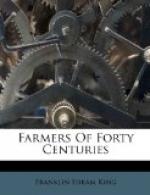One fact which we do not fully understand is that, wherever we went, house flies were very few. We never spent a summer with so little annoyance from them as this one in China, Korea and Japan. It may be that our experience was exceptional but, if so, it could not be ascribed to the season of our visit for we have found flies so numerous in southern Florida early in April as to make the use of the fly brush at the table very necessary. If the scrupulous husbanding of waste refuse so universally practiced in these countries reduces the fly nuisance and this menace to health to the extent which our experience suggests, here is one great gain. We breed flies in countless millions each year, until they become an intolerable nuisance, and then expend millions of dollars on screens and fly poison which only ineffectually lessen the intensity and danger of the evil.
The mechanical appliances in use on the canals and in the shops of Canton demonstrate that the Chinese possess constructive ability of a high order, notwithstanding so many of these are of the simplest forms. This statement is well illustrated in the simple yet efficient foot-power seen in Fig. 42, where a father and his two sons are driving an irrigation pump, lifting water at the rate of seven and a half acre-inches per ten hours, and at a cost, including wage and food, of 36 to 45 cents, gold. Here, too, were large stern-wheel passenger boats, capable of carrying thirty to one hundred people, propelled by the same foot-power but laid crosswise of the stern, the men working in long single or double lines, depending on the size of the boat. On these the fare was one cent, gold, for a fifteen mile journey, a rate one-thirtieth our two-cent railway tariff. The dredging and clearing of the canals and water channels in and about Canton is likewise accomplished with the same foot-power, often by families living on the dredge boats. A dipper dredge is used, constructed of strong bamboo strips woven into the form of a sliding, two-horse road scraper, guided by a long bamboo handle. The dredge is drawn along the bottom by a rope winding about the projecting axle of the foot-power, propelled by three or more people. When the dipper reaches the axle and is raised from the water it is swung aboard, emptied and returned by means of a long arm like the old well sweep, operated by a cord depending from the lower end of the lever, the dipper swinging from the other. Much of the mud so collected from the canals and channels of the city is taken to the rice and mulberry fields, many square miles of which occupy the surrounding country. Thus the channels are kept open, the fields grow steadily higher above flood level, while their productive power is maintained by the plant food and organic matter carried in the sediment.




